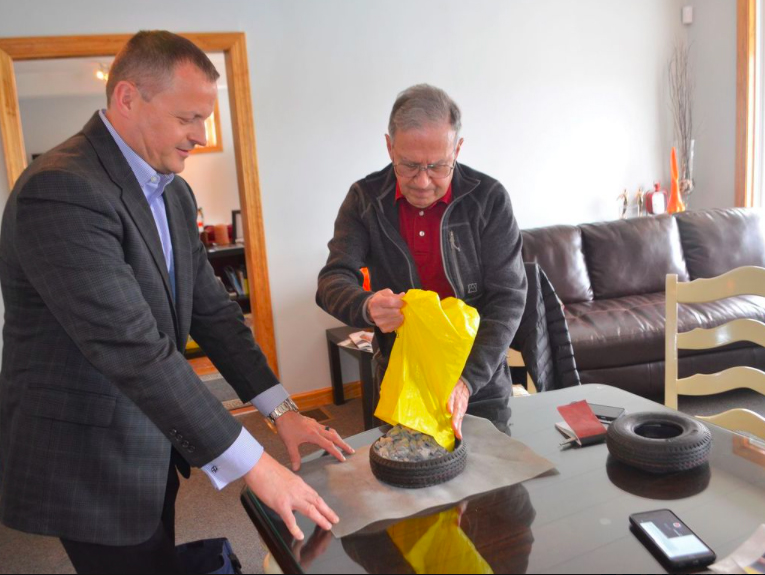By JOHN DAHLIA
The Preston County News and Journal
MORGANTOWN, W.Va. — According to the West Virginia Division of Highways, despite its relatively small size, the Mountain State is home to approximately 36,000 miles of state-maintained highways. Imagine how many millions of potholes exist on those thousands of miles of country roads people drive each day.

(Photo by John Dahlia)
But if Morgantown inventor Samuel G. Bonasso and his partner, Jim Matuga, get their wish, West Virginia’s millions of potholes could very well be permanently repaired by their new company’s innovation, the Pothole Terminator by Mechanical Concrete.
“We’ve got a long-term, permanent solution that can actually reduce the costs of road maintenance,” Bonasso said. “We can do a 3×3 pothole for less than $100, and it will last indefinitely.”
“The Legislature gave us a bunch of scrap tires to get rid of,” Bonaso said. “I asked the engineers, ‘Why couldn’t you just bury them in the base of the road?’ They said, ‘You can’t because they will retain water.’ I spent four years trying to figure out how to get rid of both problems.”

(Submitted photo)
He received a U.S. Patent for the technology in 2008. During that period, Bonasso developed the idea through the traditional technology development stages of modeling, field tests, lab tests and three full-scale demonstration projects.
In the simplest explanation, both Bonasso and Matuga said the Pothole Terminator by Mechanical Concrete takes crushed stone and puts it inside a thin-walled cylinder, which is an old tire with its sidewalls removed, and then it’s covered up.
“So when you confine this aggregate, it’s solid; it’s not going anywhere,” Matuga said. “You can put asphalt, concrete or even more stone over it.”
Once installed, the now-fixed roadway is permeable, allowing water to run through it without causing damage.

(Submitted photo)
“It’s like a structural French drain,” Bonasso said.
A French drain is essentially a trench filled with gravel or rock or a perforated pipe that redirects surface water and groundwater away from an area. Much like the Pothole Terminator by Mechanical Concrete, French drains prevent ground and surface water from penetrating or damaging a foundation — or, in this case, the roadway base.
“Most road surface failures are caused by water penetrating into the compacted base-stone binder, causing it to fall apart,” Bonasso said. “This causes road edge collapse, potholes, ruts and creates safety problems for drivers.
Another big problem can be warmer-than-average temperature days. Water freezes and then thaws underneath highway blacktop, which takes a toll on many state roads. State highways workers use one of two typical pothole patching methods: The first is called the temporary cold patch, used to simply cover potholes; the second, more permanent fix, uses hot mix with actual blacktop.
“They don’t even dig the hole out,” Bonasso said.
The Pothole Terminator’s inventors say it’s not only a cost-effective solution to the age-old pothole dilemma, but it’s also friendly to the environment.
“It’s now a tire-derived cylinder and when you pave over top of it, the tire become inert,” Matuga said.
In the beginning, Bonasso worked on several large-scale, long stretches of road installations of his Mechanical Concrete technology. Those projects took place in five states, including California, Ohio, Arizona, Texas and his home state of West Virginia.
“California was with the Department of Homeland Security on the Mexican border for two miles of road,” Bonasso said. “Texas was for a local county. Ohio was a landfill operation. Arizona was a farm road.”
Right around this time was when Matuga, Bonasso’s longtime friend and statewide media expert who co-founded of Inneraction Media in Morgantown, got involved.
“I’ve been dreaming about the ‘Pothole Terminator’ for a while,” Matuga said. “We’ve got a long-term, permanent solution for this real blight in West Virginia and around the country.
“We’re not putting a Band-Aid over the pothole,. We’re actually getting to the root of it and fixing it once and for all.”
Pothole Terminator by Mechanical Concrete is open for business as of March 27 and has already performed two case studies in the Greater Morgantown area. The first was for the Town of Granville, and the most recent was a pothole repair project for the Mountain Line Transit Authority.
“We want to get it out to the world,” Matuga said.
See more from The Preston County News and Journal





